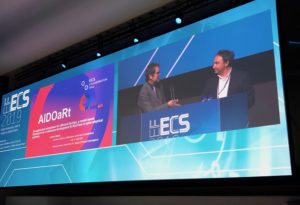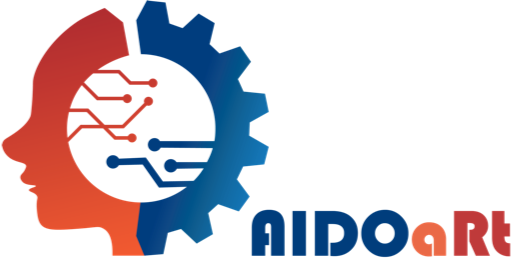Helsinki was the official venue for the EFECS event where MegaM@rt2 was represented by the Finnish and Swedish and Spanish consortium. The 19,20 and 21 of November in the Finish capital, the partners showed the new steps that MegaM@rt2 project is going to follow and what we want to achieve before the end of this proposal. Also, hand in hand with Gunnar Widforss from Mälardalen University and Diego Grimani from Ro Technology, in the event, was explained the next step of our consortium: a new proposal that follows MegaM@rt3, AIDOaRt.

Widforss and Grimani presenting AIDOaRt
MegaM@rt2 is a set of tools, methods, and guidelines to help developers in the software development process in systems engineering and service development for embedded systems. MegaM@Rt2 mitigates the risk and errors produced during software implementation on hardware by proposing a continuous development methodology and tooling for improving (iteratively)system design thanks to feedback obtained from runtime-collected information (from the system that can be actually deployed, or just simulated).
The MegaM@Rt2 project’s main goal is to create a framework incorporating methods and tools for the continuous development and runtime Verification & Validation (V&V) of complex software-intensive systems. The MegaM@Rt2 architecture integrates three main complementary capabilities: systems design engineering, runtime traceability on system-level, and global model and traceability management. The ultimate goal is to significantly improve productivity, agility, and predictability in the development of complex safety-critical and real-time systems at industrial scale.
AI-augmented automation for efficient DevOps, a model-based framework for continuous development At RunTime in cyber-physical systems.
Nevertheless, the EFECS event was the place where MegaM@rt2 presented our new idea to a brand-new European project: AIDOaRt. This is AI-augmented automation for efficient DevOps, a model-based framework for continuous development At RunTime in cyber-physical systems. The project idea is focusing on AI-augmented automation supporting modeling, coding, testing, monitoring and continuous development in Cyber-Physical Systems (CPS). The major goal of AIDOaRT is to provide a model-based framework to support the continuous development of CPS: Provide an infrastructure intended to work within the DevOps practices combining software development and information technology (IT) operations and employ AIOps in multiple aspects of the system development process (i.e., modeling, coding, testing…).
The main goals of this new proposal are three: Provide a model-based framework to support the continuous CPS development process by introducing AI-augmented automation. Enhance the DevOps toolchain by employing AI and Machine Learning (ML) technique in multiple aspects of the system development process (as modeling, coding, testing, and monitoring). And finally, support the monitoring of runtime data (such as logs, events, and metrics), software data and traceability (Observe), the analysis of both data historical and real-time data (Analyze) and the automation of functionality (Automate).

